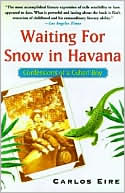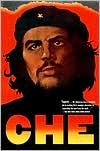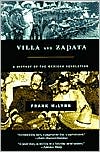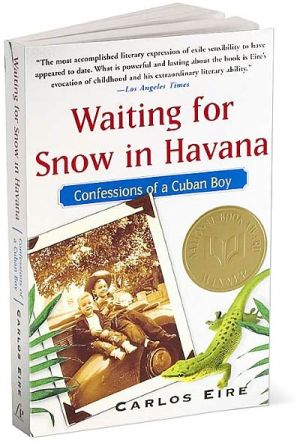Havana Dreams: A Story of Cuba
A fascinating, powerfully evocative story of four generations of Cuban women, through whose lives the author illuminates a vivid picture--both personal and historical--of Cuba in our century.\ "When I want to read a culture," writes Wendy Gimbel in her prologue, "I listen to stories about families, sensing in their contours the substance of larger mysteries." And certainly in the Revuelta family she has found a source of both mystery and revelation.\ At its center is Naty: born in 1925,...
Search in google:
A fascinating, powerfully evocative story of four generations of Cuban women, through whose lives the author illuminates a vivid picture—both personal and historical—of Cuba in our century."When I want to read a culture," writes Wendy Gimbel in her prologue, "I listen to stories about families, sensing in their contours the substance of larger mysteries." And certainly in the Revuelta family she has found a source of both mystery and revelation. At its center is Naty: born in 1925, educated in the United States, a socialite during the Batista era, who after marriage to a prominent doctor and the birth of a daughter became intoxicated with Castro and his revolution (here, published for the first time, are the letters they exchanged while he was in jail). Though her husband and daughter immigrated to the United States after Castro's victory, Naty remained in Cuba to raise her second child, Castro's unacknowledged daughter, only to be ultimately confronted by his dismissive, withering judgment: "Naty missed the train." Her two daughters, one of whom settles well into life in America, while the other never recovers from her father's intransigent repudiation of her; her granddaughter, who Naty desperately believes will return to Cuba when—not if—Castro is removed from the island; and her mother, an unregenerate reactionary: these are the lives that complete this extraordinary story.Each of the women is irrevocably marked with a part of the island's terrible and poignant tale, and Wendy Gimbel has created a rich and intense narrative of their lives and times. Havana Dreams leaves us with an indelible impression of familial obligation and illicit love; of the heady but doomed romanticism of revolution; and of the profound consequences of Cuba's contemporary history for the ordinary and most intimate lives of its people. Mark Falcoff [A] remarkably entertaining book...among other things a vivid and compelling social history of twentieth-century Cuba. -- National Review
\ Alma GuillermoprietoGimbel's sense of wonder, and her bounty seeker's ruthless appetite, are equal to the impossibly rich trove that the besieged, fantastical island has to offer. The result is a shimmering book.\ — The New York Times Book Review\ \ \ \ \ Mark Falcoff[A] remarkably entertaining book...among other things a vivid and compelling social history of twentieth-century Cuba. -- National Review\ \ \ Publishers WeeklyThe centerpiece of this highly personal, disjointed history of modern Cuba is a brief affair between a married Havana socialite named Naty Revuelta and Fidel Castro, carried out mostly in love letters written in 1953-54 while the future dictator was in jail. The affair fizzled, but not before Castro supposedly left his paramour with a daughter, Alina, who created a minor sensation in 1993 when she immigrated to the U.S. and joined protesters demonstrating against the Cuban leader's 1995 U.N. appearance in New York City. Castro never publicly acknowledged the legitimacy of the daughter, and though references are made to photographs of the Cuban leader and Alina together, none are included here. Gimbel ("Edith Wharton") interviewed four generations of Revuelta women to reconstruct the family's story through their sad experiences as deposed Cuban elites, scorned lovers and defectors. The result is a virulently anti-Castro document with a confusing mix of characters either relieving the glorious pre-revolutionary past or denying that such a past ever existed. The book is often sentimental. "Fidel Castro knew how to make love to a woman without ever touching her." But the love letters, like much of the book, provide little insight into Castro's development and suggest only that even a hardened revolutionary can churn out banal but tender sentiment when smitten with a woman.\ \ \ \ \ Library JournalWritten by a journalist with a Ph.D. in English whose father was Cuban and mother American, this fascinating study of a Cuban family focuses on four women. Its main character is a middle-class woman named Naty Revuelta who became intrigued with Fidel Castro and remained in Cuba after the 1959 revolution, when her husband and oldest daughter left for the United States. The book also includes the publication of some 1954 correspondence between Fidel and Naty when he was a prisoner in Cuba. Gimbel examines the life of Naty's mother, Natica, and Naty's two daughters-one who was raised in the United States and the other who is Castro's unacknowledged child. She succeeds in showing the complexity of family relationships resulting from the Cuban revolution, which extends into two countries. Not just for Latin American collections, this book will be important to most libraries interested in literary historical works in general. Mark L. Grover, Brigham Young Univ., Provo, UT\ \ \ \ \ BooknewsRecounts the lives of four generations of Cuban women, telling through their stories the embattled history of their nation in the 20th century. The eldest woman portrayed was a privileged housewife in pre-revolutionary Cuba; her daughter carried on an illicit affair with the young Castro, and the book reprints the letters they exchanged while he was imprisoned. This woman's daughters, including one fathered by Castro, and granddaughter round out the story, which is well-told through a blend of reporting and oral history. Annotation c. by Book News, Inc., Portland, Or.\ \ \ \ \ Caroline KnappIn the best of times, writes Wendy Gimbel, "history is gentle; in Cuba, it has been harsh, severe." This simple statement belies a more complex truth -- that history has a defining potency, forming the most essential core of emotional experience; that we are, at heart, where we live -- and Gimbel brings the harshest aspects of that belief to light in Havana Dreams, her evocative, compassionate story of the way three generations of Cuban women were affected by Fidel Castro's rise to power.\ Gimbel's interest in the subject is deeply personal: As an infant, she was abandoned by her parents and raised by her grandmother, a Cuban matron who took her on annual visits to her family in Santiago, a place that would linger in her memory as blessed and idyllic, where "the children chased each other in tiled patios filled with sunlight, and ate the sour-sweet fruit that hung from the mamoncillo branches." When she returned to the country as an adult, in 1991, she witnessed firsthand the way a single political event -- Castro's revolution -- could shape ordinary lives, altering the very texture of human experience: She saw emotional structures crumbled, family ties severed, friends and relatives driven into exile. The themes that had shaped her own early life -- abandonment, disillusionment, trauma -- were writ large on this tiny island, and Gimbel set out to understand what had happened: how historical context, both personal and political, could so inform us.\ She tells this story through three women whose lives span the 20th century on the island: Naty Revuelta, born in 1925, a wealthy, restless socialite during the Batista era, who became Castro's lover just before his ascension to power; Naty's mother, an unrepentant reactionary named Doña Nacita, who lives almost entirely in the past; and Naty's daughter, Alina, who is Castro's illegitimate, unacknowledged child.\ In Gimbel's hands, their lives become an intimate historical document, one that illuminates the intersection between a woman's internal and external worlds. The story of Naty is an allegory of Castro's failed promise, of "the ruin of the revolution." Passionate and rebellious, coming of age at a time of social upheaval, Naty sacrificed both her marriage and her future happiness on the altar of his ideology, only to be discarded when she no longer served his purposes. Doña Nacita, strong-willed and materialistic, reflects the protected, rarefied Cuba of the past. She grew up at a time when "men sought adventure and women settled for the protections of a good marriage." Castro's revolution stripped her of the wealth and social status that formed the core of her identity, leaving her culturally estranged, embittered, longing for the luxuries of the past. Alina, born in 1956, suffered the most obvious emotional damage. Volatile and troubled, she was conceived in a desperate bid by Naty to seal her own connection to Castro, and she emerges as the product of an angry world: bitter, unable to connect with others, self-destructive.\ Gimbel recounts these women's stories with insight, heart and a decided lack of judgment. Any one of them would be easy to stereotype -- the rebel mom, the reactionary grandma, the twisted child of the revolution -- but Gimbel, a graceful and precise writer, so carefully evokes the particulars of their lives, and so deftly interweaves their tale with the larger story of Cuba's social and political transformation, that what emerges instead is a rich and varied portrait, one that remains true to its mission. It is, as the book's subtitle suggests, a story of Cuba; it is also an achingly human tale about false promises, the blinding power of passion, the life-altering failures of family. Salon June 25, 1998\ \ \ \ \ \ Rompalske...[F]our generations of strong-willed Cuban women serve as a powerful metaphor for the history of that troubled island nation as a whole in Wendy Gimbel's compelling new biography Havana Dreams: A Story of Cuba....Castro was caputured and imprisioned ...[and] Naty became his faithful correspondent....Castro...wrote surprisingly tender responses....they are reasons alone to read this book. -- Biography\ \ \ \ \ Kirkus ReviewsA socialite. A revolutionary. A sour grandmother. Gimbel, a literary scholar turned freelance journalist, weaves these characters together with a few history lessons for an enjoyably dramatic family-based tale. Gimbel summered in Cuba as a child with her Cuban grandmother, until the revolution, when her relatives came to the US. Returning to the island in 1991, she realizes her own family's experience has become irrelevant. Instead, she focuses on the remains of another family, aristocrats before the revolution, who decided to stay. Gimbel's heroine, Naty Revuelta, is still fighting her disillusionment by the revolution she supported in the1950s. A restless housewife and the unofficial press agent to Fidel Castro during his failed raid on the Moncada barracks in 1953, Naty began a flirtatious correspondence with Castro while he was in prison. The love letters the two exchanged are included here. When Castro was released, they consummated their affair, but he quickly disappeared, leaving Naty and her husband with his baby. Soon after the revolution, Naty dismissed her husband in the futile hope that she would reunite with Castro. Naty's principal companion became her ancient mother. A woman who compared herself to Queen Elizabeth, Naty's mother, was never a supporter of the revolution. She had stayed in Havana simply because she couldn't think of living anywhere else. Anxious for guests who could appreciate her crystal and English china, Naty's mother had little but caustic remarks for her daughter. Telling the tale of a divorced friend, she noted, "They didn't start agitating for a communist revolution, just because things were difficult." Naty and Fidel's daughter had no patience forthe revolution either, and found her 15 minutes of fame as a high profile defector to the US. Describing life in a Havana plagued with shortages of electricity, meat, and gasoline, Gimbel rejects dogma to tell an intensely personal story about how the revolution changed everything.\ \








